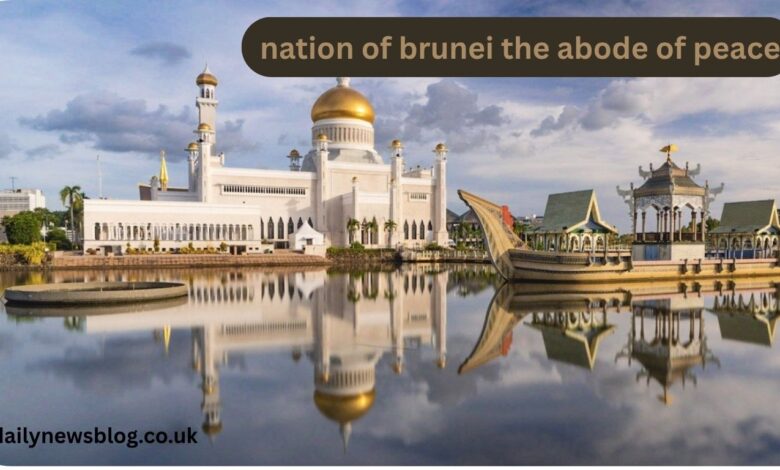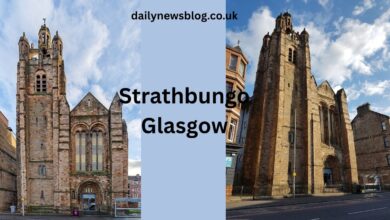The Nation of Brunei the Abode of Peace: Paradise Found

Nestled quietly on the northern coast of Borneo, the Nation of Brunei the Abode of Peace is a tranquil, oil-rich sultanate in Southeast Asia. With its shimmering mosques, rainforests teeming with biodiversity, and a society anchored in Islamic values, Brunei is often described as a modern utopia. Its official name, Negara Brunei Darussalam, translates to “The Nation of Brunei, the Abode of Peace”—a fitting title for one of the most serene and prosperous countries in the world.
Despite its modest size, Brunei boasts a legacy of resilience, royal prestige, and economic brilliance that has positioned it as a hidden gem for both travelers and investors.
Where Is the Nation of Brunei the Abode of Peace, Located?
Situated on the northwestern edge of the island of Borneo, Brunei is flanked by the Malaysian state of Sarawak and faces the South China Sea. The country is unique in that it is split into two separate parts by Malaysian territory. While small in land area—only around 5,765 square kilometers—it boasts an outsized reputation for peace and prosperity.
Brunei’s coastal position offers it stunning seaside views, while the interior is covered by dense jungles. This geographic setup not only gives Brunei its natural charm but also isolates it from regional conflict zones, adding to its image as a true “Abode of Peace.”
Why Is Brunei Called the Abode of Peace?
A Title Rooted in Spiritual and Political Harmony
The term “Abode of Peace” is more than a poetic descriptor; it reflects Brunei’s long-standing commitment to internal harmony, religious respect, and civic order. Its name, Darussalam, stems from the Arabic word for peace—salaam. The Sultanate’s policies aim to maintain this sense of peace through cultural preservation, legal order, and religious adherence.
Unlike many nations that have endured political unrest or warfare, Brunei has maintained a record of stability since gaining full independence from the United Kingdom in 1984. The leadership promotes unity through the Melayu Islam Beraja (Malay Islamic Monarchy) philosophy, ensuring that peace is not just a goal but a way of life.
Brunei’s citizens benefit from free public services, low crime, and a tight-knit, family-centered society. These pillars of daily life contribute to the peaceful and orderly rhythm that defines the nation.
The Royal Heritage of Brunei
The Sultanate’s Influence
The monarchy is central to Brunei’s political and cultural life. His Majesty Sultan Haji Hassanal Bolkiah has ruled since 1967 and is widely respected for maintaining peace, economic stability, and cultural traditions. As both head of state and head of government, the Sultan ensures decisions are unified and swiftly implemented, minimizing bureaucratic gridlock.
The Sultan resides in Istana Nurul Iman, the world’s largest residential palace. This 1,788-room palace is not just a home but a symbol of Brunei’s wealth and reverence for tradition. Royal ceremonies, national celebrations, and diplomatic receptions often take place here, reinforcing the monarchy’s integral role in maintaining peace and order.
In Brunei, the monarchy is not merely ceremonial; it is the backbone of the nation’s success story.
Economic Prosperity in the Nation of Brunei the Abode of Peace
Oil Wealth and High Living Standards
Brunei’s economy is heavily reliant on petroleum and natural gas, which account for more than 90% of its exports. This vast wealth allows the government to fund social programs, infrastructure development, and maintain a debt-free status. The country’s GDP per capita is one of the highest in Asia, reflecting the population’s strong purchasing power and comfortable living standards.
What truly sets Brunei apart is its generous welfare state. Citizens enjoy access to world-class public healthcare and education, often at no cost. Public housing schemes are designed to help all citizens achieve home ownership. These benefits create a sense of national unity and pride, contributing further to the nation’s peaceful ethos.
As Brunei begins to diversify its economy through Islamic banking, eco-tourism, and technology, its future remains as bright as its oil-lit past.
Culture and Tradition in Brunei Darussalam
The Malay Islamic Monarchy (MIB)
Brunei’s national philosophy, Melayu Islam Beraja (MIB), is a unique fusion of three essential components: Malay culture, Islam as the state religion, and monarchy as the system of governance. These pillars are deeply embedded in the national consciousness, shaping everything from school curricula to national celebrations.
Cultural practices are respected and preserved. Traditional dress is commonly worn, especially during public holidays and events. The Hari Raya Aidilfitri celebrations, following the fasting month of Ramadan, see families open their homes to visitors, reflecting a national spirit of generosity and harmony.
MIB isn’t just an abstract concept—it’s a living tradition that guides social behavior, reinforces moral values, and fosters peace among Brunei’s citizens.
Natural Beauty and Tourism in Brunei
Eco-Tourism and Religious Wonders
While Brunei may not be as popular as its Southeast Asian neighbors for tourism, it has much to offer those seeking authenticity, spirituality, and untouched nature.
- Ulu Temburong National Park offers one of the last pristine rainforest experiences in the world. Accessible by boat and jungle trail, it offers breathtaking views from canopy walkways and sightings of rare species.
- The Sultan Omar Ali Saifuddien Mosque, built on an artificial lagoon, is an architectural marvel and a symbol of Brunei’s Islamic faith. It draws both worshippers and photographers alike.
- Kampong Ayer, a centuries-old water village, provides a glimpse into traditional Bruneian life. With schools, mosques, and markets floating on stilts, it’s often called the “Venice of the East.”
Tourism in the Nation of Brunei the Abode of Peace, is about more than sightseeing—it’s about experiencing serenity in its purest form.
Religion and Peace in Brunei
Islam’s Role in Daily Life
Islam is deeply ingrained in Bruneian society. Roughly 80% of the population adheres to Sunni Islam, and Islamic values influence legal codes, daily etiquette, and even public holidays.
While Brunei enforces aspects of Sharia law for Muslims, the country also respects religious freedom. Christian churches and Buddhist temples operate without interference. Religious harmony is carefully nurtured, contributing to the nation’s peaceful social fabric.
Daily prayers, modest dress, and Islamic education are part of life, but without imposing pressure on non-Muslim communities. This balance is one reason why Brunei retains the “Abode of Peace” label not just politically, but spiritually.
Public Services and Quality of Life
Healthcare, Education, and Social Support
Brunei’s welfare model is robust. Healthcare is almost entirely government-funded, with hospitals and clinics offering modern medical care for free or at a nominal cost. Education is compulsory and free through university level, and many students receive government scholarships to study abroad.
Public transport is subsidized, and there is a strong focus on cleanliness and public safety. With low crime rates, citizens and visitors alike feel safe at all times of day. The streets are quiet, the infrastructure is modern, and the environment is clean — all hallmarks of a high-functioning society.
This emphasis on citizen well-being cements Brunei’s identity as a peaceful and livable nation.
Fascinating Facts About the Nation of Brunei the Abode of Peace
- Zero national debt — Brunei doesn’t owe money to foreign creditors
- Largest residential palace — Istana Nurul Iman is a Guinness World Record holder
- Strict laws on alcohol — Sale and public consumption are banned, creating a calm nightlife
- Biodiversity hotspot — Home to over 400 bird species and endangered primates
- No income tax — Citizens keep 100% of their salaries
Frequently Asked Questions
Which nation is known as the Abode of Peace?
The Nation of Brunei the Abode of Peace, officially called Brunei Darussalam, holds this unique title that reflects its peaceful society and Islamic values.
Why is Brunei called the Abode of Peace?
Brunei is known as the Abode of Peace due to its long-standing stability, low crime, harmonious religious coexistence, and governance rooted in Islamic and traditional principles.
What is Brunei famous for?
Brunei is famous for its oil wealth, beautiful mosques, pristine rainforests, and the leadership of Sultan Hassanal Bolkiah. It also has one of the highest standards of living in Asia.
Is Brunei Sunni or Shia?
Brunei is a Sunni Muslim country, following the Shafi’i school of Islamic thought.
Is Brunei a rich country?
Yes, Brunei is very wealthy thanks to its abundant oil and gas reserves. It ranks among the world’s top countries in terms of GDP per capita.
How to apply for a Brunei visa?
Visa requirements vary by nationality. Some countries receive visa-free access, while others must apply through Brunei’s embassies. Visit the official Brunei Immigration Department website for up-to-date details and application forms.
Conclusion
The Nation of Brunei the Abode of Peace, lives up to its name with remarkable success. Rooted in cultural wisdom, guided by a revered monarchy, and supported by oil-rich prosperity, Brunei offers its citizens a life of peace, dignity, and opportunity.
It is one of the few countries in the world where peace is more than a slogan—it’s a lived experience, visible in the calm streets, smiling faces, and spiritual richness of everyday life.
For those seeking a destination that offers tranquility, tradition, and unmatched hospitality, Brunei is truly paradise found.
SEE MORE ARTICLES Dailynewsblog




